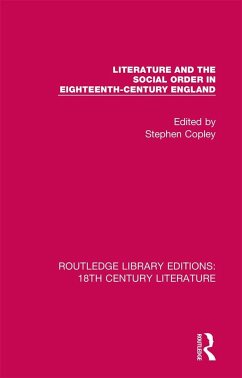
Theory and Practice in the Eighteenth Century
Writing Between Philosophy and Literature
Herausgeber: Dick, Alexander; Lupton, Christina
Versandkostenfrei!
Versandfertig in 1-2 Wochen
65,99 €
inkl. MwSt.
Weitere Ausgaben:

PAYBACK Punkte
33 °P sammeln!
Brings together scholars who use literary interpretation and discourse analysis to read 18th-century British philosophy in its historical context. This work analyses how the philosophers of the Enlightenment viewed their writing; and, how their institutional positions as teachers and writers influenced their understanding of human consciousness.













